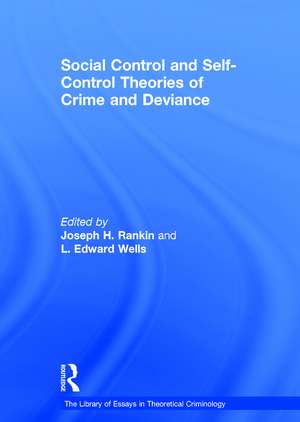Social Control and Self-Control Theories of Crime and Deviance: The Library of Essays in Theoretical Criminology
Autor L.Edward Wellsen Limba Engleză Hardback – 28 iul 2011
Preț: 1586.55 lei
Preț vechi: 2204.41 lei
-28% Nou
Puncte Express: 2380
Preț estimativ în valută:
303.68€ • 329.98$ • 255.26£
303.68€ • 329.98$ • 255.26£
Comandă specială
Livrare economică 31 martie-14 aprilie
Doresc să fiu notificat când acest titlu va fi disponibil:
Se trimite...
Preluare comenzi: 021 569.72.76
Specificații
ISBN-13: 9780754629443
ISBN-10: 0754629449
Pagini: 550
Dimensiuni: 169 x 244 mm
Greutate: 1.29 kg
Ediția:1
Editura: Taylor & Francis
Colecția Routledge
Seria The Library of Essays in Theoretical Criminology
Locul publicării:Oxford, United Kingdom
ISBN-10: 0754629449
Pagini: 550
Dimensiuni: 169 x 244 mm
Greutate: 1.29 kg
Ediția:1
Editura: Taylor & Francis
Colecția Routledge
Seria The Library of Essays in Theoretical Criminology
Locul publicării:Oxford, United Kingdom
Cuprins
Contents: Introduction; Part I Early Developments in Social Control Theory: Delinquency as the failure of personal and social controls, Albert J. Reiss; Social disorganization and stake in conformity: complementary factors in the predatory behavior of hoodlums, Jackson Toby; Techniques of neutralization: a theory of delinquency, Gresham M. Sykes and David Matza; A new theory of delinquency and crime, Walter C. Reckless; Delinquency, situational inducements, and commitment to conformity, Scott Briar and Irving Piliavin. Part II Sources of Social Control: Parental attachments and delinquency, Joseph H. Rankin and Roger Kern; Direct parental controls and delinquency, L. Edward Wells and Joseph H. Rankin; Parental monitoring: a reinterpretation, HÃ¥kan Stattin and Margaret Kerr; Parents, peers and delinquency, Mark Warr; A multilevel analysis of the relationships among communal school organization, student bonding, and delinquency, Allison Ann Payne. Part III Self-Control Theory: The empirical status of Gottfredson and Hirschi's General Theory of Crime: a meta-analysis, Travis C. Pratt and Francis T. Cullen; An empirical test of a General Theory of Crime: a four-nation comparative study of self-control and the prediction of deviance, Alexander T. Vazsonyi, Lloyd E. Pickering, Marianne Junger and Dick Hessing; Testing the core empirical implications of Gottfredson and Hirschi's General Theory of Crime, Harold G. Grasmick, Charles R. Tittle, Robert J. Bursik Jr and Bruce J. Arneklev; Self-control as an executive function: reformulating Gottfredson and Hirschi's parental socialization thesis, Kevin M. Beaver, John Paul Wright and Matt Delisi; A longitudinal test of the effects of parenting and the stability of self-control: negative evidence for the General Theory of Crime, Callie Harbin Burt, Ronald L. Simons and Leslie G. Simons; On the absence of self-control as the basis for a General Theory of Crime: a critique, Gilbert Geis; In defense of self-control, Travis Hirschi and Michael Gottfredson. Part IV Theory Integration: Substantive positivism and the idea of crime, Travis Hirschi and Michael Gottfredson; Toward an interactional theory of delinquency, Terence P. Thornberry; Self-control and social bonds: a combined control perspective on deviance, Douglas Longshore, Eunice Chang, Shih-chao Hsieh and Nena Messina; Crime and deviance over the life course: the salience of adult social bonds, Robert J. Sampson and John H. Laub; Enduring individual differences and rational choice theories of crime, Daniel S. Nagin and Raymond Paternoster; The class structure of gender and delinquency: toward a power-control theory of common delinquent behavior, John Hagan, A.R. Gillis and John Simpson; Name index.
Notă biografică
Joseph H. Rankin is Associate Dean and Professor of Criminal Justice, Wayne State University and L. Edward Wells is Professor of Criminal Justice Sciences, Illinois State University, USA
Descriere
The essays gathered together in this volume reflect the unique concern of social control and self-control theorists that patterns in criminal behaviors are better explained by variations in social constraints rather than by individual motivational impulses. The articles are arranged into four sections: the major contributors to the early developmental stage of social control theory; the central importance of parents, peers, and schools; the theoretical underpinnings of self-control theory; and theoretical integrations of social control and self-control theories with various motivational theories of crime and delinquency.











